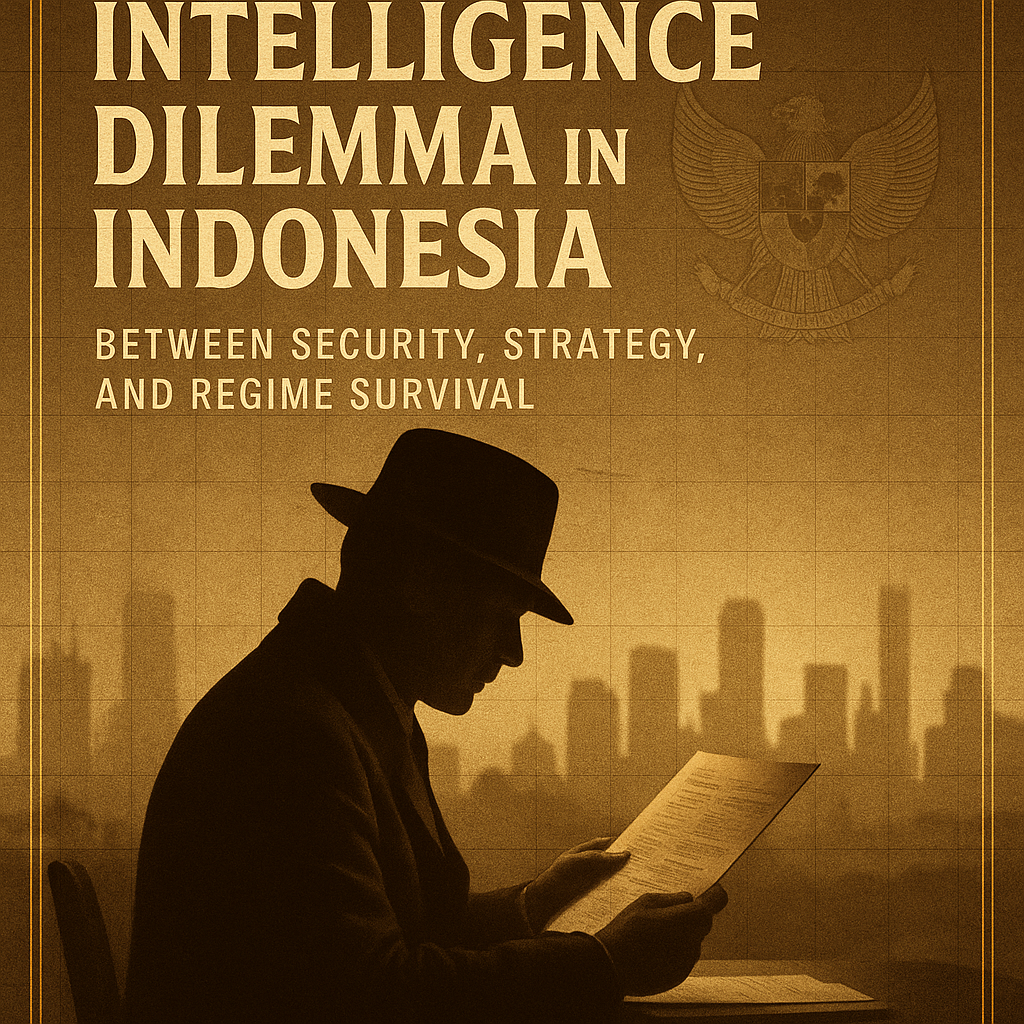Introduction: The Complex Landscape of Indonesian Intelligence
In this essay, I want to examine the intelligence situation in Indonesia — a topic that, while often associated with espionage, actually extends far beyond covert operations. In Indonesia, intelligence should be understood as a comprehensive system designed to reduce uncertainty and anticipate threats to national integrity. Yet, the coordination between intelligence institutions remains fragmented, with overlapping jurisdictions and unclear divisions of labor. This structural disorder often leads to the misuse of intelligence capabilities for specific, sometimes political, purposes.
The challenge becomes evident when intelligence institutions operate without a unified command structure. Competing interests can shape their operations, leaving intelligence vulnerable to political manipulation. The lack of clear strategic coordination has long been one of Indonesia’s most persistent governance weaknesses — one that undermines the potential for a coherent national security architecture.
From Espionage to Statecraft: Redefining the Role of Intelligence
Indonesia’s intelligence discourse is often dominated by “security intelligence,” which focuses on immediate threats to public order. However, the deeper concern lies in the marginalization of “strategic intelligence.” While the former reacts to daily crises, the latter aims to understand and anticipate national and global developments over a longer horizon. Strategic intelligence, in its pure form, provides information essential for policymaking and long-term defense planning at the international and national levels.
Unfortunately, strategic intelligence has not been institutionalized with sufficient authority within Indonesia’s national security framework. Its functions are often confined within military structures and disconnected from civilian policymaking. As a result, the nation’s leadership is frequently deprived of the analytical foresight needed to anticipate global shifts.
Security intelligence, on the other hand, is more prevalent within police and counter-terrorism circles. Its goal is to “eliminate or reduce uncertainty for government decision-makers.” While valuable, this short-term orientation limits its utility in shaping enduring statecraft.
The Presidential Brief: Managing Uncertainty and Reality
Every day, the President of Indonesia receives intelligence briefs covering economic, political, and security updates. These “brief reports” are supposed to function as early-warning mechanisms. However, the way intelligence products are presented can be influenced by political interest. Analysts often tailor their findings to align with the President’s perception or to protect the image of those in power.
This situation creates a dangerous feedback loop: intelligence ceases to function as a neutral instrument of statecraft and instead becomes a political shield. Issues such as food shortages, border disputes, and public demonstrations may appear in daily reports, but the depth of analysis is often compromised by political sensitivity. Intelligence agencies may attempt to “resolve” issues quietly before they reach the President’s desk — not to solve the problem, but to ensure it appears under control.
The result is an illusion of stability, where intelligence serves to maintain political comfort rather than inform strategic response.
Uncertainty as the Core of Intelligence Work
Understanding uncertainty is at the heart of intelligence analysis. Every nation faces questions such as: who creates uncertainty — the government, foreign powers, or non-state actors? In Indonesia, all three can be producers of instability. When uncertainty stems from the state itself, the problem may still be contained. But when external or hybrid actors (corporate entities, digital networks, ideological movements) generate uncertainty, the consequences can be far more disruptive.
The task of intelligence, therefore, is to distinguish between manufactured uncertainty and natural uncertainty. Yet, in Indonesia, intelligence agencies often conflate the two, expending more energy monitoring domestic dissent than addressing genuine transnational threats.
If uncertainty is treated merely as a political problem rather than a structural challenge, intelligence operations risk becoming reactionary — focusing on “damage control” instead of preventive strategy.
The Defensive Posture of Indonesian Intelligence
For 356 days a year, Indonesia’s intelligence community juggles issues ranging from food logistics and inflation to border conflicts and global crises. Yet, the government’s general approach remains defensive — comparable to a boxer trained only to block punches, not to counterattack.
This “boxer model” of intelligence reflects a mindset of permanent defense. Rather than proactively shaping narratives and neutralizing external threats, intelligence agencies are tasked with containing domestic unrest. Such a model sacrifices strategic depth for temporary stability.
The real victims of this defensive posture are the people themselves. The state often diverts public frustration toward trivial matters — fuel prices, cooking oil shortages, or media controversies — to diffuse pressure, while systemic vulnerabilities remain unresolved. This not only weakens national resilience but also erodes public trust in government institutions.
When Intelligence Serves the Regime, Not the Nation
A state obsessed with minor controversies — onions, cooking oil, social media trends — reveals an absence of strategic foresight. When intelligence is employed primarily to safeguard those in power rather than the state itself, it becomes an instrument of regime survival. This pattern, deeply rooted in Indonesia’s New Order era, has persisted into the contemporary period.
During the New Order, intelligence was omnipresent — watching, recording, and controlling. Today, while the democratic context has changed, the underlying logic remains: critics are silenced, dissenters are monitored, and public discourse is confined. Those who challenge the narrative risk losing careers or reputations. The police desk, not the parliament, becomes the ultimate forum of dissent resolution.
This continuity of the past shows that Indonesia has not yet redefined its intelligence philosophy. The transformation from regime-oriented intelligence to nation-oriented intelligence remains incomplete.
Toward a New Intelligence Paradigm: From “Business as Usual” to Strategic Nationhood
The time has come for Indonesia to adopt a new intelligence paradigm. Intelligence must evolve beyond the business-as-usual mindset and embrace a strategic framework that prioritizes national resilience over regime continuity. This requires three essential reforms:
-
Institutional coherence — ensuring that all intelligence agencies operate under a single national strategy with clearly defined roles.
-
Analytical independence — insulating intelligence analysis from political interference to preserve objectivity.
-
Strategic foresight — establishing long-term scenario planning to anticipate future challenges, from digital warfare to climate-driven migration.
If the state continues to define “uncertainty” in narrow political terms, it will never achieve true stability. Intelligence should not merely defend the government; it must defend the idea of the nation. Only through such transformation can Indonesia shift from a reactionary intelligence posture to a proactive, visionary intelligence system that secures both sovereignty and democracy.



Leave a Reply